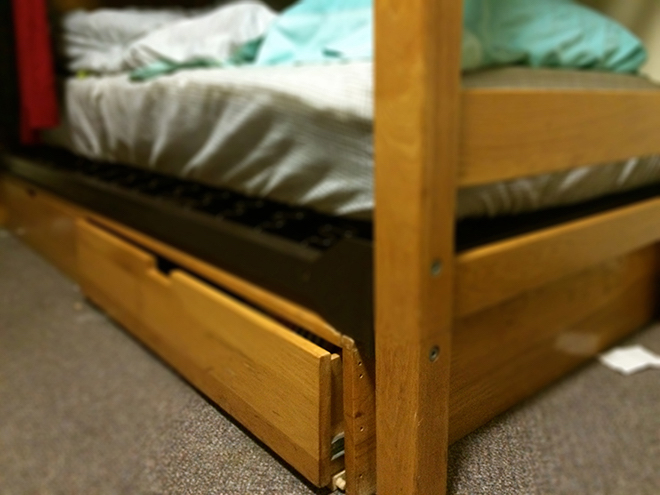For RTVF junior David Brown, furniture that looked like something out of a sketchy 1970s garage sale just came with the territory when he moved into East Fairchild his freshman year. Not long ago, anyone walking through the Communications Residential College would have seen decades of dust and sweat coating the chairs and couches. During his sophomore year tenure as CRC president, Brown successfully replaced the dorm’s haggard furniture: it only took him two years of diligence.
“The year before I arrived, [Northwestern] had just renovated the main lounge without communicating to anyone in CRC about doing it,” Brown said. “My freshman year I really started to try to kick things off in terms of getting the rest of CRC renovated to follow suit.”
Brown and CRC’s hall government brought in a university official for a walkthrough of the facilities. Despite giving them promising remarks, the official made like a character in a campfire story and was never heard from again. Only after a second walkthrough with a new official a year later did they finally receive their updated furniture. While only a relatively small renovation, the furniture is a large improvement to the building’s environment.
Many residential buildings like CRC struggle with faulty facilities and residents often aren’t sure how best to relay these troubles to the university. As a way to eliminate future problems with facilities, Northwestern will roll out a 10-year “master plan” that features extensive renovations for most of the residential halls on campus. Paul Riel, executive director of Northwestern Residential Services, projects finishing all renovations by 2025, which will include Shepard, Jones and Foster-Walker, to name a few.
“Buildings will be completely stripped back to the core of the walls and then we’ll do new plumbing, new electrical,” Riel said. “They’ll just be new buildings from the inside and out.”
Even with the introduction of widespread renovations, communication between students and facility management still feels like a long distance relationship rather than a close one.
Some students have taken matters into their own hands. Freshman Suzanne Chen and her hallmates in Chapin were fed up with a noisy, irritating bathroom hand dryer. Deciding that timely help from facilities management was more of a dream than a reality, they devised a plan to take turns sharing their individual hand towels for communal use to dry their hands instead.
“It’s not helpful at all and it keeps people up at night, so we wanted to have people take turns putting a hand towel there for the entire hall to use,” Chen said. “If you have a good community of people, you can come up with solutions for things that may not necessarily be solved in a timely manner by the school.”
Chen hasn’t given much thought to reporting the hand dryer to maintenance, as the towel rotation is easy and rather handy. She’s adamant, however, that students at Northwestern could probably do with fewer unnecessary issues in their lives.
“We’re paying thousands of dollars to come to this school,” Chen said. “The least they could do would be to create an environment in which we can learn and not have to worry about the state of our bathrooms.”
Elisabeth Lusche, a Bienen sophomore, recently had a “test” fire alarm go off every few minutes during the night in her room in 1835 Hinman. Flames hadn’t engulfed her dorm room in a fiery inferno, but the alarm still went through several rounds of unnecessary beeping. Ultimately, she resorted to unplugging it and removing the batteries to shut it off.
She believes it’s Northwestern’s responsibility to convey to students what resources are available to them and how to properly deal with problems such as these.
“If I had a problem with my air conditioning, I don’t know if I would know immediately who I would call for that,” Lusche said. “I would probably say something to my RA, but where do you go from there?”
Maintaining discussion with the University kept the ball rolling toward gaining the newer, habitable furniture CRC needed, according to Brown. In other words, sustained, constructive conversation creates inclusion and leads to the solution.
“University implementation of policies is just not very well communicated to undergrads, and that’s true for most everything,” Brown said. “Where it becomes most important is with things like this, where hall governments need to be kept in the loop of what’s going on to be able to tell other people, in turn, what’s going on.”
Regardless of the frustration students feel about their living environments, facilities management – while somewhat aloof in the communication department – truly wants the best for Northwestern’s students.
MaryPat Pyles, the customer service supervisor for Northwestern’s facility management, expressed concern when she heard students didn’t feel they were provided with the best service. Like all Northwestern departments, she affirms that facilities management is here because of the university and its students.
“Our students are our priority,” Pyles said. “We have to follow the process that residential services has put in place with going through the proper channels, but we also want students to know that we are always available to help them.”
Navigating your way through dorm facility woes
